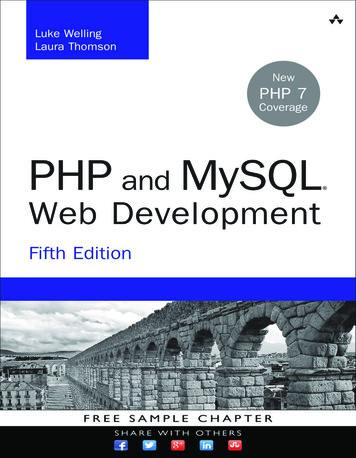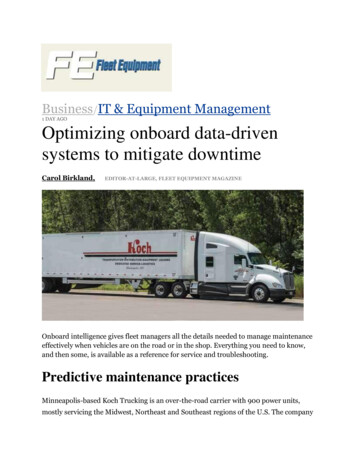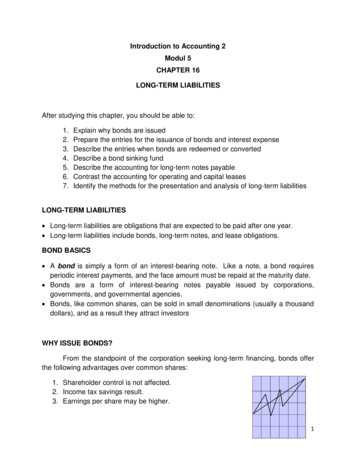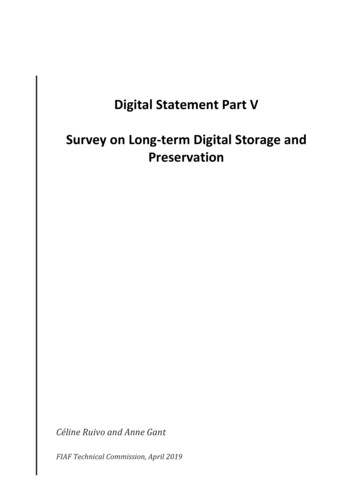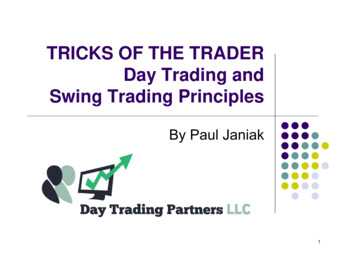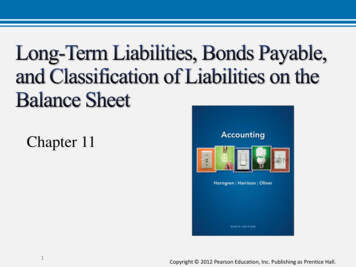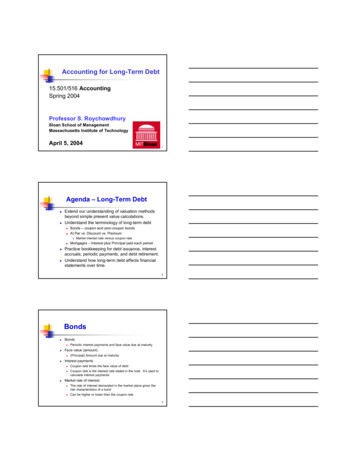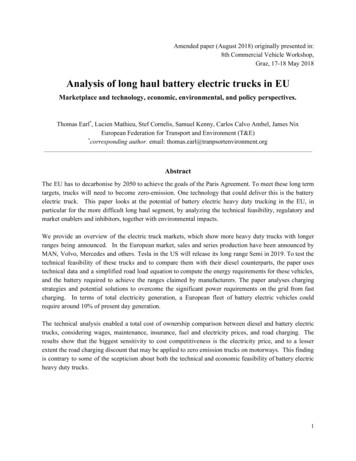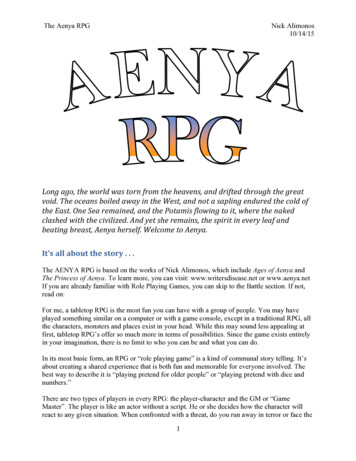
Transcription
The Aenya RPGNick metoAenya.It’sallaboutthestory.The AENYA RPG is based on the works of Nick Alimonos, which include Ages of Aenya andThe Princess of Aenya. To learn more, you can visit: www.writersdisease.net or www.aenya.netIf you are already familiar with Role Playing Games, you can skip to the Battle section. If not,read on:For me, a tabletop RPG is the most fun you can have with a group of people. You may haveplayed something similar on a computer or with a game console, except in a traditional RPG, allthe characters, monsters and places exist in your head. While this may sound less appealing atfirst, tabletop RPG’s offer so much more in terms of possibilities. Since the game exists entirelyin your imagination, there is no limit to who you can be and what you can do.In its most basic form, an RPG or “role playing game” is a kind of communal story telling. It’sabout creating a shared experience that is both fun and memorable for everyone involved. Thebest way to describe it is “playing pretend for older people” or “playing pretend with dice andnumbers.”There are two types of players in every RPG: the player-character and the GM or “GameMaster”. The player is like an actor without a script. He or she decides how the character willreact to any given situation. When confronted with a threat, do you run away in terror or face the1
The Aenya RPGNick Alimonos10/14/15danger with sword in hand? Do you make alliances with the other players’ characters or stabthem in the back and take off with their gold? The goal of the GM, on the other hand, is to ensureeverybody is fully immersed in the game’s imaginary world. The GM is the storyteller, thedirector and the referee. The goal of the GM is not to “beat” the players. There is no “winning”in a real role-playing game. Just like any novel, the game ends when the GM concludes the story.2
The Aenya RPGNick terthanVideoGames10. THEY'RE EDUCATIONAL: I've learned many things from video games, the history ofWWII from Call of Duty, the physics of racing automobiles from Gran Turismo and cityplanning from Sim City, but this kind of education is usually the exception and often limited byplay mechanics. Call of Duty does little to teach the player the historical aspects that led to thewar. Tabletop games, on the other hand, exercise the mind in every academic, from mathematicsto creative writing to graphic design. I owe much to D&D for helping my writing career.9. THEY'RE TANGIBLE: You can touch, smell, and taste. TRPGs deal with real objects: dice,miniatures, paper, and any number of props. Some people even dress up for their gamingsessions. I like to be able to physically give my players the items featured in an adventure. Themagic wand? It's right there, in your hand! Consoles have yet to simulate all 5 senses.8. THE FUN NEVER ENDS: How many times have you watched the credits roll at the end of agreat game and wished there was more? Say you love Halo, and just can't wait until HaloSix comes out. Great. But eventually, you'll get the game, marvel at all the new content, and in acouple of weeks you're back wishing and hoping for another expansion. Some franchises, likeZelda, you might have to wait half a decade for something new. In TRPGs, there is no waiting.Every game is something new.7. THEY'RE TIMELESS: Let's face it, we live in a disposal culture. The greatest thing today isgarbage the next. That is why I love D&D, because it is essentially the same since the 70's. Thenewer editions are just tweaks. Video games rarely live up to the hype, and even if they do, theexcitement quickly passes. Donkey Kong is still fun after 30 years, but my daughter treats it moreas a curiosity than anything else. In another 30 years, I doubt the teenagers of that time will careabout Halo the way the teens of today do. Consequently, I look forward to sharing TRPGs withmy children.6. YOU CAN ALWAYS IMPROVE IT: Every video game has something that just doesn't workperfectly. The reason for this is simple: everyone's tastes differ, and programmers can nevermake us all happy equally. We all wish that one impossible level would go away at the end ofsuch and such game; we've all said to ourselves, "Wouldn't it be cool if . . ." Well, in a tabletopgame, you can! Don't like the rules to 4th edition D&D? Toss them out. Think the rail gun in RedFaction is too cheap, or the end boss in Metroid Prime too hard, or that Princess Peach should beplayable in New Super Mario Bros.? Too bad.5. SOMETIMES THE HERO FAILS: This might sound like a bad thing, but when victory isassured, it's meaningless. Will Nathan Drake find the lost city of gold and save his girlfriend?There's no doubt, and for this reason, there can be no real tension, no genuine excitement. In aTRPG, you're not always the hero. The universe does not revolve around your character. You arepart of a group and must prove your worth, and even then there are never any guarantees. Iplayed Dragon Mountain, a module for D&D, for three months with a friend until a red dragonobliterated my party. That was it. The end. More recently, MMORPGs have tried to address thisissue, but the problem then becomes the opposite. Your actions are irrelevant. The next big3
The Aenya RPGNick Alimonos10/14/15expansion in World of Warcraft isn't directly related to what YOU did and how you played.Failing a quest in WoW won't affect the game for the millions of other subscribers.4. YOU CAN BE ANYTHING: I tire of playing with other people's ideas, in worlds created inother people's imaginations. Tabletop games allows me to make the rules, the heroes, everything.Nothing can beat the hero that comes from your own mind! And just among friends, copyrightinfringement means nothing, so you can literally be anyone, from Conan to Indiana Jones toHomer Simpson.3. THEY'RE SOCIAL: Never mind social networking. I could care less about the guy in Chinawho's kicking my ass in Street Fighter; I mean, it's great that the technology exists to play withpeople from around the world, but why would I want to do that? I prefer the company of friendsand family, face-to-face, across the table. The Internet still can't replace real, genuine, humaninteraction.2. ACTIONS HAVE CONSEQUENCES: My nephew, who is new to TRPGs, thought it a goodidea to drink a bunch of vials he found in a lab, not even bothering to check what the liquidswere. Doubtless, he would not drink whatever chemicals he'd find in my closet. But this is thevideo game mindset, because you can always respawn or reload with a console. You can die ahundred times in an afternoon without the slightest concern. But in a TRPG, you drink acid, youdie, and die for good. Maybe the GM will take pity on you and find a way to revive you, but itwill never be as easy as a reset button. It reminds me of a friend who ran a game where one ofhis players died. The player was distraught for days, until his mom called my friend up to ask,"Why did you kill my son!"1. ANYTHING CAN HAPPEN! Computer and video game gamers never realize the narrowparameters set upon them and their imaginations. It's as if they've lived their whole lives in aprison, so they don't really know they're imprisoned. As much freedom as The Legendof Zelda, Grand Theft Auto or World of Warcraft give you, it's nothing compared to the infinitepossibilities you can have in a tabletop game, and the worst part is, people hooked on videogames are trained to limit their thinking, imagination and creativity because of it. Often, I findthat people with zero gaming experience have an easier time thinking "outside the box." Iremember playing a D&D campaign with a friend who simply could NOT understand what hewas "supposed to do." It never occurred to him that he didn't have to fight the monster at all tosave the girl. Say you like a sandbox adventure like Zelda . . . instead of fighting and killingevery goblin in sight, why not subdue one, tie him to a tree, and force him to tell you where thehidden key is? And if he doesn't listen, maybe you'll break his knuckles? Of course, you can'teven think about doing something like that, because it isn't programmed into the game.4
The Aenya RPGNick op RPG’s utilize a lot of numbers and dice, which can be daunting, at first. And yet, I haveplayed entire adventures without having to look at a single number. Much of the game dependson the style people prefer and the kinds of story telling the GM likes to tell. Dice rolling comesinto play when someone makes an action that the GM leaves to chance. A story telling sessionmight go something like this:GM: You are running as fast as you can, feeling the broken terrain beneath yourbare feet, but the bogrens are getting closer. You come to the edge of the forestwhere, dropping ten feet below, a river cuts through the valley. A rope bridgecrosses to the other side, but it looks rather worn. What do you do?Jasmine (playing Thelana): Can I jump to any of the rocks below?GM: You can try, but there is a chance of falling. Hurry, you can hear the bogrensgetting closer.Jasmine (playing Thelana): OK, I’ll take my chance with the bridge.GM: You run across it as it starts to collapse. Roll (the dice) to see if you grab ontosomething.The above situation called for an action roll. Dice rolling falls into two categories: action rollsand battle rolls.Battle(melee): Battle occurs when a character meets a monster or when two characterscross paths and wish to fight.Ø In melee, an initiative roll is made using a d6 (a six sided dice) to determine whichcharacter reacts faster; the player with the higher number makes the first attack.Ø Attacks are made with the d20 (20 sided dice). If the roll equals or exceeds the target’sARMOR, the hit succeeds, and HEALTH points are taken equal to the attacker’s damage.Ø A roll of ‘20’ always hits, regardless of ARMOR.Ø For characters, the type of weapon being used determines damage. A short sword, forinstance, deals 2 dmg.; this is written as: short sword 2. For monsters who do not useweapons, damage may be listed simply: dmg 3.Ø The GM rolls dice for enemies.Ø When an enemy is killed, the player is rewarded with XP equal to the HEALTH of thatenemy; for * multiply by 2, for ** by 3 and for *** by 4. For instance, if you kill abogren with 3 health, you are rewarded 3 XP. If the monster is listed as having HEALTH3*, you are rewarded 3 x 2 6 XP.Battle(ranged): Certain weapons allow for ranged attacks. A ranged attack can be made: ifthe target is within range, a clear shot (nothing in the way), and a straight shot (no shootingaround corners). Ranged attacks can be made while moving or standing still. When a character5
The Aenya RPGNick Alimonos10/14/15moves into the range of another, the one standing wins initiative, even if not their turn. Rangedattacks cannot be made in melee (on the same point).Battle(fleeing): If a battle is going badly, a player may attempt to run away. Upon fleeing,the character incurs one free attack. The GM decides whether an enemy chooses to pursue. If acreature’s Move rate exceeds the character, the character is unable to escape, unless analternative to running is found: hiding in a room, a high perch, etc. The base move rate forhumans is 3 (3 squares on a board), although this may be increased through skills or magic items.ROLLING TO HITRolling to hit is the most needlessly complex mechanic in gaming—but in THEAENYA RPG, by simply knowing your target’s ARMOR, you know what to roll.While limiting the number of “hits”—this easily satisfies the need to simulatehitting and missing while treating combat more realistically. Surviving a blow froma medieval weapon is rare, and being continuously “grazed” by swords and axesin an RPG makes little visual sense. Even if the notion is that “Health” equals someabstraction, such as “heroism,” what is all this talk of hitting and missing for?Great warriors knew how to execute a kill and this is where damage comes intoplay. In short, there is no need for a “modifier worksheet” in THE AENYA RPG—all you should be thinking about is your skills and how best to use them.ARMOR BREAKDOWN (WHAT THE NUMBERS MEAN)1. WOODEN CHOPPING BLOCK2. SLEEPING MAIDEN3. DRUNKEN THUG4. UNSUSPECTING PEASANT ATTACKED FROM BEHIND5. SOLDIER KNOCKED PRONE6. MERQUID7. A RUNNING CHILD8. ILMARIN9. BANDIT WITH LEATHER ARMOR10. AGILE ROGUE11. MAN-AT-ARMS WITH SHIELD AND HELMET12. SEPTHERAN13. CENTURION IN LEATHER, PLUMED HELM AND HOPLON14. SEPTHERAN, TRUE15. GOLEM16. SNAIL, GIANT17. GOLEM, ANCIENT18. ZO ARCHITECT19. CONCRETE WALL6
The Aenya RPGNick Alimonos10/14/15ACTIONSAn action is anything the player can imagine doing, from running along a wall to somersaultingthrough a ring of fire---the more creative the action the better. It is up to the GM to assign adifficulty for each action from 1 to 20:RATING1-34-67-910-1213-1516-1819-21DIFFICULTYA CHILD COULD DO ITVERY EASYEASYCHALLENGINGHARDSKILLEDDAMN NEAR IMPOSSIBLEEXAMPLES OF ACTIONS AND THEIR DIFFICULTYbreaking down a doorjumping a chasmdoor type:difficultyaged wood10strong wood13strong wood--with iron rivets18iron door22concrete wall30chasm length:5 feet10 feet15 feet20 feet25 feetdifficulty1015202530Advice for GM’s: When calculating Difficulty, consider it as pertaining to the average human—so while jumping across a 15 foot chasm may seem Damn Near Impossible for Joe the Peasant, itmight actually be easy for a monk with an impressive Agility Bonus.Actions are divided into four types: agility, wisdom, strength and enduranceEXAMPLES OF STANDARD ACTION TYPESjumpagilityclimbagilityrope swingagilityswimagilitydiveagilitytight
For me, a tabletop RPG is the most fun you can have with a group of people. You may have played something similar on a computer or with a game console, except in a traditional RPG, all the characters, monsters and places exist in your head. While this may sound less appealing at first, tabletop RPG’s offer so much more in terms of possibilities. Since the game exists entirely in your .
